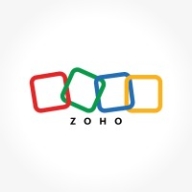

Teradata and Zoho CRM Plus are competing products in analytics and customer relationship management. While Teradata excels in enterprise-level analytics, Zoho CRM Plus has the upper hand with its integrated features tailored for customer engagement and value.
Features: Teradata offers powerful data warehousing capabilities, MPP architecture, and parallel processing, ideal for large-scale enterprises needing substantial data processing. Zoho CRM Plus provides sales automation, marketing tools, and customer support, integrating customer-centric applications for improved relations.
Room for Improvement: Teradata could enhance ease of use and reduce complexity in deployment, as it requires significant technical expertise. Additionally, simplifying the integration of customer applications may further broaden its appeal. Zoho CRM Plus can improve its analytics capabilities to match enterprise demands, enhance data processing efficiency, and expand its scalability features to compete with large enterprise solutions.
Ease of Deployment and Customer Service: Teradata's deployment process requires expertise due to its focus on complex data environments. In contrast, Zoho CRM Plus offers an accessible cloud-based deployment with quick setup and responsive customer support. Zoho CRM Plus is notably user-friendly, requiring less technical knowledge for implementation.
Pricing and ROI: Teradata involves higher setup and operational costs, aligning with its enterprise-level analytics focus. Zoho CRM Plus offers a more cost-effective pricing structure, delivering considerable features at a fraction of Teradata's cost. Teradata delivers strong ROI for organizations maximizing its functionalities, while Zoho CRM Plus provides attractive ROI for businesses prioritizing efficient CRM solutions.
| Product | Market Share (%) |
|---|---|
| Teradata | 2.1% |
| Zoho CRM Plus | 1.4% |
| Other | 96.5% |


| Company Size | Count |
|---|---|
| Small Business | 25 |
| Midsize Enterprise | 12 |
| Large Enterprise | 49 |
| Company Size | Count |
|---|---|
| Small Business | 6 |
| Midsize Enterprise | 1 |
| Large Enterprise | 1 |
Teradata is a scalable data analytics platform designed to meet enterprise demands for large-scale data management and processing, focusing on performance, scalability, and security for complex query executions.
As a leading data warehousing solution, Teradata integrates advanced analytics enabling organizations to derive insights from massive datasets. It supports high-volume data workloads with its architecture optimized for analytical queries. Users benefit from its robust scalability, allowing seamless expansion as data grows. Teradata's SQL engine is compatible with a wide range of data types, ensuring flexibility in data analysis. With advanced security measures, it protects sensitive data across various environments, providing peace of mind to users handling critical information.
What are the most important features of Teradata?Teradata is widely used in industries like finance, telecommunications, and healthcare, where data-driven decisions are critical. Companies leverage its robust analytics capabilities to enhance customer experiences, streamline operations, and ensure compliance with regulatory requirements. In these sectors, quick access to data insights can significantly impact competitive advantage.
Zoho CRM Plus enhances business development and customer management efforts with robust capabilities in sales pipeline tracking, team collaboration, and information organization to support business growth.
Zoho CRM Plus is a comprehensive platform designed for enhancing sales processes, business growth, and customer engagement strategies. It provides businesses with tools for task tracking, information documentation, collaboration, and robust sales modules that facilitate flexible organization. Reports and analytics provide valuable insights into business performance. While users appreciate its simplicity and performance, they note areas for improvement, such as interface design, technical support, and integration capabilities. The system supports adding new customers, patient monitoring, reaching VIPs, and tracking sales leads to align teams on deal progress and organizational goals.
What are the key features of Zoho CRM Plus?In industries like healthcare, Zoho CRM Plus is used for patient monitoring and improving care through better customer engagement. In business development, it aids in tracking leads and managing pipelines to achieve growth objectives. The platform's ease of use makes it adaptable across sectors, although some prefer competitors like HubSpot and Salesforce for their advanced features.
We monitor all Customer Experience Management reviews to prevent fraudulent reviews and keep review quality high. We do not post reviews by company employees or direct competitors. We validate each review for authenticity via cross-reference with LinkedIn, and personal follow-up with the reviewer when necessary.